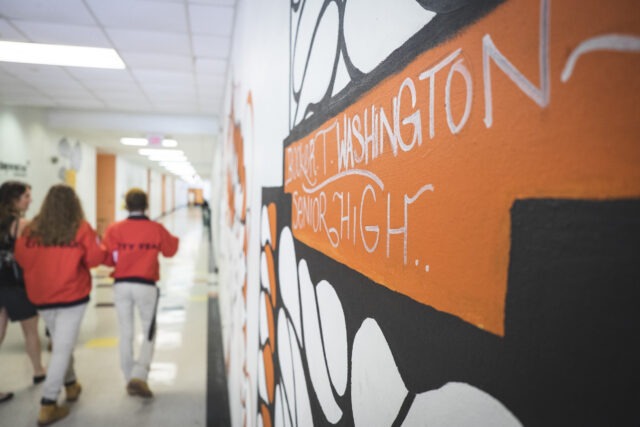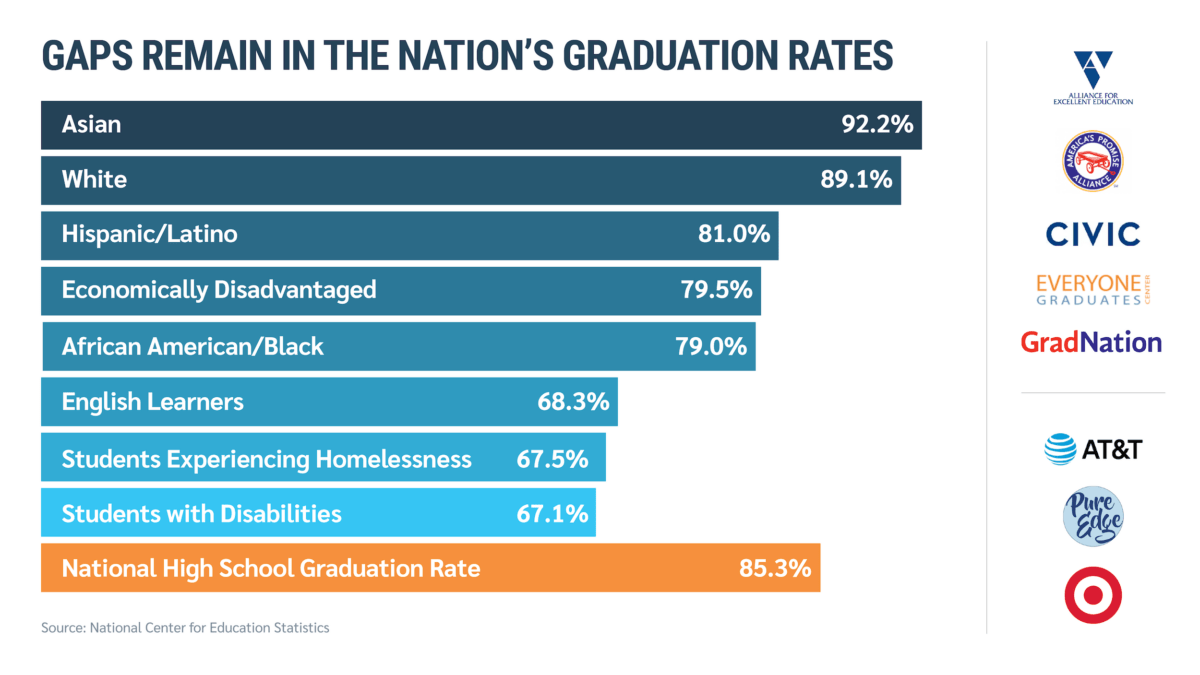What students need to graduate high school and reach their goals

In a year of uncertainty and concern about school disruptions, student learning loss, and the broader impact that COVID-19 will have on young people’s futures, the 2020 Building A Grad Nation Report—authored by Civic Enterprises and the Everyone Graduates Center at the Johns Hopkins University School of Education—offers much needed hope and a roadmap for both tackling persistent inequities in education and meeting the unique challenges brought on by the pandemic.
Progress to celebrate, yet inequities remain
Our nation has made slow and steady progress toward a commitment to achieving a 90 percent high school graduation rate. The report finds that our country has seen 14 years of increasing graduation rates (2004-2018), fueled by improvements among Black and Hispanic students, students from low-income families and students with disabilities.
Even so, students of color and students from low-income families are still trailing national averages and continue to be overrepresented in schools where less than half of students graduate from high school. These same students are also being disproportionately impacted by closed schools, learning loss, disrupted relationships, gaps in access to virtual learning, and health and well-being challenges, all caused or exacerbated by COVID-19.

These inequitable and unacceptable realities underscore a critical need to rethink what it truly means to achieve widespread student success and college and career readiness, with equity and holistic development at the forefront. In a time of disruption and ambiguity, we must shift our focus to ensure that all students feel safe and valued. All students should be equipped with a learning and achievement plan that is relevant, engaging and personal to them throughout their educational journey, particularly during their transition years between elementary, middle and high school, when research shows that students can fall of track.
Student connection to caring adults is key
Our society, communities and economy would greatly benefit if all students not only successfully reached graduation, but also left high school feeling prepared to tackle the life and post-secondary goals they set out to achieve. What if every student had a caring, consistent tutor, mentor and role model working alongside them, to help them achieve their goals and stay focused along the way to high school graduation?
“We have got to make sure that every young person feels connected to an adult,” former Secretary of Education under President Obama, now President and CEO at Education Trust John King said during a recent event that explored issues and solutions related to high school graduation during this unprecedented school year. “What we see in the schools that have closed graduation rate gaps, that have reconnected students is that they are betting on relationships.”
“We have to talk to kids and listen to their insights,” King said. “They have very strong views on many subjects that are very well informed and are often right.”
We agree. City Year believes that if more under-resourced public schools had additional support for teachers and increased student connection to caring adults, student and school outcomes would improve and we would accelerate our progress toward ensuring that at least 90 percent of students graduate from high school—regardless of their zip code, family income or racial and ethnic identity.
Amplifying student voice and agency
As part of City Year’s commitment to partnering with systemically under-resourced public schools and communities, City Year has focused on providing research-informed holistic supports—academic, social and emotional—to schools with the highest number of students who do not complete high school, as called out by the Grad Nation report, and the elementary and middle schools that feed into those high schools.
We strive to support student learning and address inequitable access to educational opportunity through the full-time service of our remarkable AmeriCorps members. These 3,000 young adults are trained and serve hundreds of public elementary, middle and high schools that are systemically under-resourced, partnering with classroom teachers to provide additional resources and relationships that help students thrive in school and in life.
City Year AmeriCorps members prioritize developing positive, fun and consistent relationships with the students they serve, particularly students who are behind in core academic classes or who are struggling with regular attendance or with social-emotional skills—all signs that a student is at increased risk for dropping out of high school. Corps members give students individualized attention and infuse the school day with humor and joy, which helps students to feel valued, supported and invested in their own learning.
While acting as near-peer mentors and tutors to students, AmeriCorps members weave social-emotional supports into one-on-one and small-group academic lessons. This is an approach which continues to be successful in advancing key student outcomes such as grades, test scores and attendance—all factors that contribute to a students’ likelihood to stay on track for high school graduation.
Through partnering with schools and communities over the past three decades, City Year has learned that students open up to people they trust. They need safe spaces to speak their truths, share their talents and express their goals. And like adults, they thrive best when they operate and learn in strong, connected school communities where they are heard and understood as complex people.
Our AmeriCorps members develop genuine, caring and trusting relationships with students by being proximate to them and their everyday lives and through active listening. They give students space and encouragement to be their authentic selves, elevate their voices and work with them to co-create goals and outline solutions.
We can all learn from a two-way exchange of ideas and decision-making as we consider what students truly need to thrive in school, have positive academic experiences and persist toward graduation and productive, choice-filled lives as adults. During COVID-19, it’s especially critical for education leaders, policymakers and partners in this work to capture a full picture of the hardships students face and the opportunities they foresee in their own educational journey.
Students experience school—in all its complexity—every single day. What would it look like for them to step up and lead in the reimagining of the supports, practices and policies designed to help them reach graduation and achieve their post-secondary goals?
Student Success Coaches: A valuable addition to schools
Deeply understanding student needs, challenges and opportunities will require increased resources and human capacity that we know too many schools do not have, especially those in economically disadvantaged neighborhoods that have been historically under-resourced and are hardest hit by the pandemic.
That’s where national service comes in as part of an effective and efficient solution. Thousands of diverse, young adults seek to serve their country and help communities respond to the pandemic. When highly trained and then partnered with systemically under-resourced schools, one way these young adults can support students, educators and schools is by serving as student success coaches (SSCs). City Year is one example of the student success coach model.
Before COVID-19, student success coaches across the country were already partnering with teachers and building positive, consistent relationships that we know are essential to student learning and development. This targeted and cost-effective approach is one viable and proven model to consider as school leaders seek solutions for nurturing joyful learning environments, strengthening student resilience, and promoting trust in the school years ahead. As we know from decades of research and our experience serving in schools, when we commit to prioritizing evidence-based interventions that support student social-emotional development, student academic outcomes and persistence towards graduation also rise.
Learn more about how City Year AmeriCorps members, who serve as student success coaches, are expanding educational equity and ensuring students are on track to graduate during COVID-19.
Related stories
Yes, the holiday season can be stressful—making travel plans, wrapping up work before winter break, figuring out what gifts to...
Read more about Three reasons students may be thankful for their student success coachEvery year, thousands of young people decide to join AmeriCorps programs for a year (or more!) of service, helping to...
Read more about Everything you need to know about returning for another year as a City Year AmeriCorps memberCity Year is committed to providing our AmeriCorps members with resources, opportunities and support that help them to achieve their...
Read more about Empowering Futures: City Year Baton Rouge’s Partnership with Bottom LineFatimah Abdulmateen takes service seriously. Fatimah served two years with City Year as an AmeriCorps member, making her an alum...
Read more about A City Year alum with a passion for service—both here and abroad















